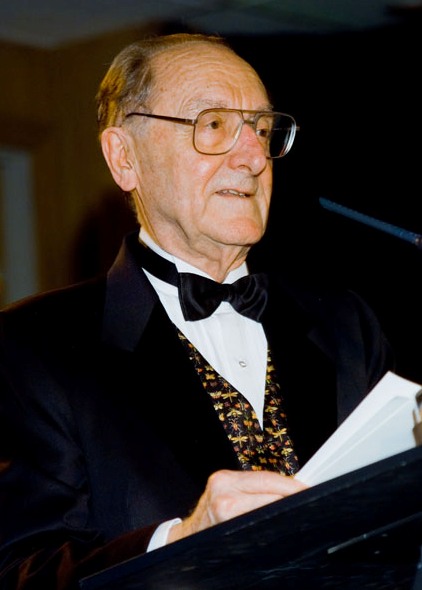2002 NATIONAL SPACE TROPHY RECIPIENT
Dr. George E. Mueller

George Mueller. (NASA photo, 2002)
Profile as published in the March 8, 2002 program book. Author unknown.
George Mueller, Ph.D. has been a key player in the United States aerospace program for nearly five decades. Often referred to as the "father of the space shuttle program," his contributions have led to major advancements in the ballistic missile, Apollo, Skylab, space Shuttle and commercial programs.
Since 1995, Dr. Mueller, 83, has served as chief executive officer of Kistler Aerospace Corporation, where he directs the development and operations of the K-1, a commercial reusable launch vehicle, is designed to deliver satellites into low-Earth orbit and provide a low-cost alternative to single-use launch vehicles. Dr. Mueller guides Kistler's professional team, along with seven major aerospace contractors who are collaborating on the program. He also directs corporate strategies in launch site selection, marketing, finance and corporate relations.
After earning a master's degree in electrical engineering from Purdue University in 1940, he joined the technical staff at Bell Telephone Laboratories. In 1946, he became a professor of electrical engineering at Ohio State University, developing curriculum unique engineering-based courses and laboratory research projects. Four years into his teaching career, he earned his doctorate in physics. Dr. Mueller later took a one-year sabbatical at Ramo Wooldridge Corporation where he led the design review of the missile guidance systems for the Intercontinental Ballistic missile (ISCBM) program. The challenges of this program and its application to space exploration inspired Dr. Mueller to take a full-time position with Ramo Wooldridge in 1957. As the head of the electronic laboratories division, he oversaw the guidance and control systems of the Atlas, Titan, Thor and Minuteman ballistic missiles. He was also the project engineer for the development of the United States' first successful space probe, Pioneer 1, and for the establishment of the U.S. Air Force SPAN satellite tracking network.
By now, the year was 1963 and the United States was in a race to put a man on the Moon by the end of the decade. Having earned a reputation as a successful manager of space programs, Dr. Mueller joined NASA as the associate administrator for manned space flight. As leader of the Apollo and Saturn programs, he quickly saw that current plans called for testing individual pieces of flight-ready hardware in a single mission. This plan was not going to lead to the lunar landing before 1971. Therefore, Dr. Mueller proposed to drastically condense testing plans. His "all-up" approach tested all pieces of flight-ready hardware in one single launch. Although considered extremely risky, Dr. Mueller's approach was later acknowledged as the only ay NASA was able to achieve the lunar landing by the end of the '60s.
During his six-year career at NASA, Dr. Mueller supervised the actions of the directors at three NASA field centers. He also developed one of the most sophisticated and successful management systems ever devised, which synergized the activities of 20,000 industrial firms, 200 universities and colleges, and thousands of individuals. He originated Skylab, and authored "An Integrated Program of Space Utilization and Exploration," which has been the guiding document for NASA for several decades following the Apollo program.
Dr. Mueller left NASA in 1969 to launch a career in private industry. He joined General Dynamics Corporation as its senior vice president, supervising the defense division and managing the company's transition in the post-Apollo era. In 1971, he joined System Development Corporation, a pioneer in large computer-based systems and a major developer of software systems for the U.S. Air Force. Over 12 years, Dr. Mueller served as chairman, chief executive officer and president, helping to convert this company from a not-for-profit government contractor into a competitive, for-profit systems house. From 1983 until 1995, he was president of Jojoba Propagation laboratories and chairman of Desert King Jojoba Corporation. At the same time, he launched his own technical and management consulting firm, which he operated until 1995.
Throughout this period, Dr. Mueller remained active in the aerospace community, serving as the president of the American Institute of Aeronautics & Astronautics (AIAA) from 1969-1982 and the president of the International Academy of Astronautics (IAA) from 1982-1997.
Dr. Mueller's accomplishments have garnered him tremendous accolades from educational institutions, as well as space-based organizations and groups. He holds honorary doctorates from six major universities. He also has received three NASA Distinguished Service Medals and received the National Medal of Science in 1970 for his contributions to the design of the Apollo system.
Throughout his entire career, Dr. Mueller has been described as an inspirational leader who combines intellect with practicality to outline a clear vision for success. He has always demanded excellence from his employees by empowering them with the authority and support to successfully perform their assignments. This unique approach has led him to created first-rate technical teams for nearly 50 years.
A native of St. Louis, Missouri, Dr. Mueller is the father of four grown children. He and his wife, Darla Jean, have been married since 1978 and currently reside in Kirkland, Washington.
